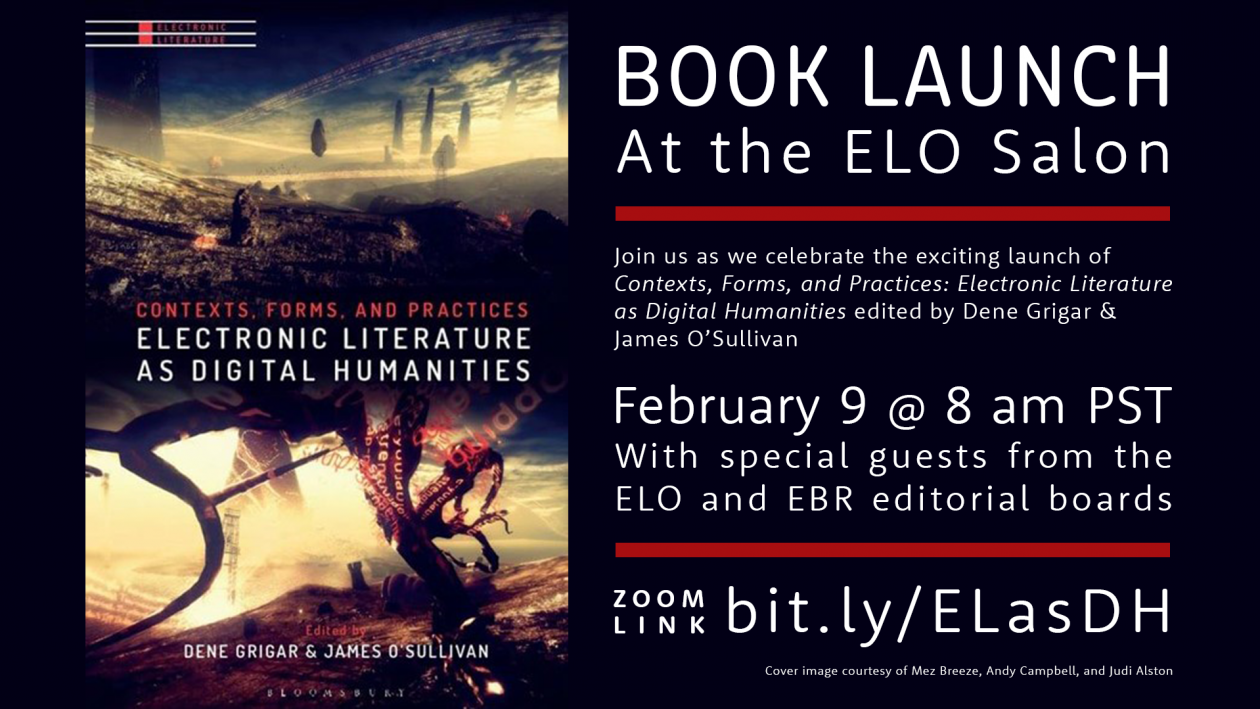Your cart is currently empty!
Mark Marino
-
Addressing EDI in ELO
Please read this important letter from the ELO Board of Directors. You can download a pdf here. Dear Members of the ELO Community, As the recent letters addressed to our… Read more.
·
-
E-lit as DH Book Launch Feb 9
Book Launch at Electronic Literature Organization Salon Electronic Literature as Digital Humanities: Contexts, Forms, and Practices by Dene Grigar and James O’Sullivan Join us as we celebrate the exciting launch… Read more.
-
Tribute to the Flash Generation Dec. 31
A Toast to the Flash Generation Thursday, December 31, 2020 10 a.m.-5 p.m. PST Zoom: http://bit.ly/ToastToFlash Hosted by Dene Grigar, Director, Electronic Literature Lab; Digital Preservationist, Electronic Literature Organization Join… Read more.
-
CFP: ELO 2021 Conference and Festival: Platform (Post?) Pandemic
ELO 2021 Conference and Festival: Platform (Post?) Pandemic Co-chairs: Søren Pold, University of Aarhus and Scott Rettberg, University of Bergen Dates The academic conference will take place May 24-28th, 2021.… Read more.
·
-
ELO Announces Recipients of Emerging Spaces for E-Lit Creations
The ELO Board of Directors is pleased to announce that it is funding two proposals for its 2020 Emerging Spaces for E-Lit Creations initiative. The two winning proposals are Filter… Read more.
·
-
ELC4 Collective adds Lyle Skains
We are pleased to announce that the editorial collective of the 4th volume of the Electronic Literature Collection is adding a new member, Lyle Skains. Skains will be bringing a… Read more.
·
-
Announcing the 2020 ELO Fellows
ELO is pleased to announce the ELO Fellowship scheme into its second year, aiming to expand our scholarly activity, and our curatorial and creative practices with the appointment of seven… Read more.
-
ELO Amplify Anti-Racism Fellowships (June 21)
In the spirit of protest, change, and justice, and in an attempt to further strengthen its EDI (Equity, Diversity, Inclusion) framework, the Electronic Literature Organization invites applications for two dedicated… Read more.
·
-
Call for ELO Research Fellows 2020/21 (May 31)
Call for ELO Research Fellows 2020/21 Deadline: May 31st, 2020 The ELO is expanding its scholarly activity, creative, and curatorial practices with the appointment of six graduate and early career… Read more.
-
Announcement: ELO 2020: Moving Forward, Virtually
The ELOrlando leadership team has found ourselves, like many conferences, faced with rethinking our plans. We were thrilled to be hosting you here in Orlando this July, but in light… Read more.
·

